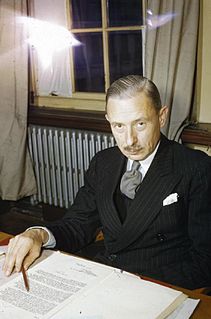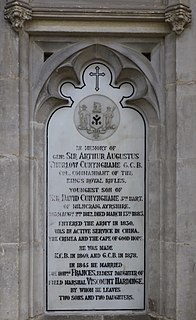Related Research Articles

Sir William Wallace was a Scottish knight who became one of the main leaders during the First War of Scottish Independence.

John Balliol, known derisively as Toom Tabard, was King of Scots from 1292 to 1296. Little is known of his early life. After the death of Margaret, Maid of Norway, Scotland entered an interregnum during which several competitors for the Crown of Scotland put forward claims. Balliol was chosen from among them as the new King of Scotland by a group of selected noblemen headed by King Edward I of England.

Benjamin Jowett was an influential tutor and administrative reformer in the University of Oxford, a theologian, an Anglican cleric, and a translator of Plato and Thucydides. He was Master of Balliol College, Oxford.

Hardinge Stanley Giffard, 1st Earl of Halsbury, PC QC later KC was a British lawyer and Conservative politician. He served three times as Lord High Chancellor of Great Britain, for a total of seventeen years.

Henry Hardinge, 1st Viscount Hardinge, was a British Army officer and politician. After serving in the Peninsula War and the Waterloo Campaign he became Secretary at War in Wellington's ministry. After a tour as Chief Secretary for Ireland in 1830 he became Secretary at War again in Sir Robert Peel's cabinet. He went on to be Governor-General of India at the time of the First Anglo-Sikh War and then Commander-in-Chief of the Forces during the Crimean War.

Charles Hardinge, 1st Baron Hardinge of Penshurst, was a British diplomat and statesman who served as Viceroy and Governor-General of India from 1910 to 1916.

Colonel Arthur Hay, 9th Marquess of Tweeddale,, known before 1862 as Lord Arthur Hay and between 1862 and 1876 as Viscount Walden, was a Scottish soldier and ornithologist.

John de Balliol was an English nobleman, belonging to the House of Balliol. Balliol College, in Oxford, is named after him.

Gilbert Wakefield (1756–1801) was an English scholar and controversialist. He moved from being a cleric and academic, into tutoring at dissenting academies, and finally became a professional writer and publicist. In a celebrated state trial, he was imprisoned for a pamphlet critical of government policy of the French Revolutionary Wars; and died shortly after his release.

Dervorguilla of Galloway was a 'lady of substance' in 13th century Scotland, the wife from 1223 of John, 5th Baron de Balliol, and mother of John I, a future king of Scotland.
Harold Thomas William Hardinge, known as Wally Hardinge, was an English professional sportsman who played both cricket and association football for England. His professional cricket career lasted from 1902 to 1933 during which he played first-class cricket for Kent County Cricket Club and made one Test match appearance for England. He was described as being "for years ... one of the leading opening batsmen in England".

Major Alexander Henry Louis Hardinge, 2nd Baron Hardinge of Penshurst, was Private Secretary to the Sovereign during the Abdication Crisis of Edward VIII and during most of the Second World War.

Sir Ivone Augustine Kirkpatrick, was a British diplomat who served as the British High Commissioner in Germany after World War II, and as the Permanent Under-Secretary of State for Foreign Affairs, the highest-ranking civil servant in the Foreign Office.
Events from the year 1844 in the United Kingdom.

Edward Balliol was a claimant to the Scottish throne during the Second War of Scottish Independence. With English help, he ruled parts of the kingdom from 1332 to 1356.
The Second War of Scottish Independence broke out in 1332 when Edward Balliol led an English-backed invasion of Scotland. Balliol, the son of a former Scottish king, was attempting to make good his claim the Scottish throne. He was opposed by a Scots loyal to the occupant of the throne, eight-year-old David II. At the Battle of Dupplin Moor Balliol's force defeated a Scottish army ten times their size and Balliol was crowned king. Within three months the Bruce partisans had regrouped and forced Balliol out of Scotland. He appealed to the English King, Edward III, who invaded Scotland in 1333 and besieged the important trading town of Berwick. A large Scottish army attempted to relieve it but was heavily defeated at the Battle of Halidon Hill. Balliol established his authority over most of Scotland, ceded to England the eight counties of south-east Scotland and did homage to Edward for the rest of the country as a fief.

Sir Arthur Henry Hardinge,, was a senior British diplomat.
William FitzHardinge Berkeley, 1st Earl FitzHardinge, known as The Lord Segrave between 1831 and 1841, was a British landowner and politician.

The siege of Berwick lasted four months in 1333 and resulted in the Scottish-held town of Berwick-upon-Tweed being captured by an English army commanded by King Edward III. The year before, Edward Balliol had seized the Scottish Crown, surreptitiously supported by Edward III. He was shortly expelled from the kingdom by a popular uprising. Edward III used this as a casus belli and invaded Scotland. The immediate target was the strategically important border town of Berwick.

General Sir Arthur Augustus Thurlow Cunynghame was a British Army commander and memoirist. Cunynghame was colonel-commandant of the King's Royal Rifle Corps and of the 36th Regiment of Foot.
References
- ↑ Thirlwell, Angela (2003). William and Lucy: The Other Rossettis . Yale University Press. p. 248. ISBN 0-300-10200-3.
- ↑ Rintoul, M. C. (1993). Dictionary of Real People and Places in Fiction . Taylor & Francis. p. 481. ISBN 0-415-05999-2.